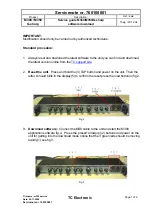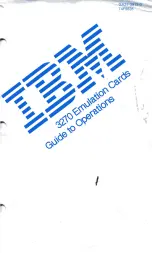
90
EPSON
S1C63454 TECHNICAL MANUAL
CHAPTER 4: PERIPHERAL CIRCUITS AND OPERATION (Interrupt and HALT)
EIPT1, EIPT0: Interrupt mask registers (FFE2H•D1, D0)
IPT1, IPT0: Interrupt factor flags (FFF2H•D1, D0)
Refer to Section 4.10, "Programmable Timer".
EISIF: Interrupt mask register (FFE3H•D0)
ISIF: Interrupt factor flag (FFF3H•D0)
Refer to Section 4.11, "Serial Interface".
KCP03–KCP00: Input comparison registers (FF22H)
SIK03–SIK00: Interrupt selection registers (FF20H)
EIK0: Interrupt mask register (FFE4H•D0)
IK0: Interrupt factor flag (FFF4H•D0)
Refer to Section 4.4, "Input Ports".
EIT3–EIT0: Interrupt mask registers (FFE6H)
IT3–IT0: Interrupt factor flags (FFF6H)
Refer to Section 4.8, "Clock Timer".
EISW1, EISW10: Interrupt mask registers (FFE7H•D1, D0)
ISW1, ISW10: Interrupt factor flags (FFF7H•D1, D0)
Refer to Section 4.9, "Stopwatch Timer".
4.13.5 Programming notes
(1) The interrupt factor flags are set when the interrupt condition is established, even if the interrupt
mask registers are set to "0".
(2) After an interrupt occurs, the same interrupt will occur again if the interrupt enabled state (I flag =
"1") is set or the RETI instruction is executed unless the interrupt factor flag is reset. Therefore, be sure
to reset (write "1" to) the interrupt factor flag in the interrupt service routine before shifting to the
interrupt enabled state.
(3) After an initial reset, all the interrupts including NMI are masked until both the stack pointers SP1
and SP2 are set with the software. Be sure to set the SP1 and SP2 in the initialize routine.
Further, when re-setting the stack pointer, the SP1 and SP2 must be set as a pair. When one of them is
set, all the interrupts including NMI are masked and interrupts cannot be accepted until the other one
is set.















































